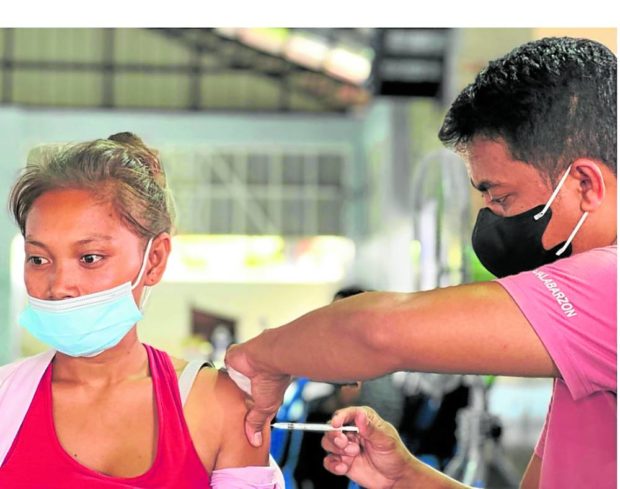Indigenous peoples to train as health workers

ONE TOO FEW | This Sama-Bajau native in Lucena City is among the latest to be inoculated on Aug. 17 and one of just over 120 of the 1,000 members of the indigenous peoples group who agreed to be vaccinated against COVID-19. (Photo from the Facebook account of the Department of Health Calabarzon)
LUCENA CITY, Quezon, Philippines — The Department of Health (DOH) in Calabarzon (Cavite, Laguna, Batangas, Rizal, Quezon) has signed an agreement with other government agencies for a project that aims to train indigenous peoples (IPs) in the region to become health workers serving their own communities.
The training program for the “Katutubo Health Workers” (KHWs) was inked in a joint agreement signed on Aug. 17 by the representatives from the DOH, the National Commission on Indigenous Peoples, people’s organization, and local government officials of Tanay town in Rizal province.
The project aims to empower the KHWs in serving the communities of the Dumagat Remontados tribe living in the Sierra Madre mountain ranges “to bridge the gap among the underserved and unserved population to promote better health outcomes,” according to the DOH.
“These has been our goal under Universal Health Care that no Filipino would be left behind, whatever color and culture they may be part of, towards a healthy Philippines,” Dr. Ariel Valencia, DOH-Calabarzon director, said in a statement on Sunday.
COVID-19 vaccines
The training will enable the KHWs to, among others, learn disease surveillance skills and equip them with knowledge on how to conduct health education activities in their communities. The training program will be conducted up to the end of this year, the region’s DOH said.
Article continues after this advertisementThe DOH said it will provide financial, technical and administrative support to implement the training and monitor the performance of KHWs.
Article continues after this advertisementLast week, the DOH also held a dialogue with the Sama-Bajau ethnic group in this city to explain to them the benefits and safety of COVID-19 vaccines amid reluctance in some IP communities to get inoculated.
According to Valencia, wrong information circulating in social media on the supposed adverse effects of COVID-19 vaccines remained the primary reason why many in the IP communities would not want to get vaccinated.
RELATED STORIES
Palace: Declining vaccine hesitancy reflects cooperation in proper info drive
Vaccine hesitancy drops nationwide; Visayas, Mindanao folks most hesitant — OCTA
Vaccine hesitancy also observed among provincial barangay officials